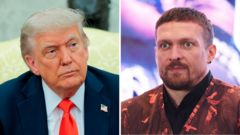The outcome could reshape the social media landscape, with potential repercussions for Meta's CEO, Mark Zuckerberg.
**Major Antitrust Case Against Meta: Potential Sale of Instagram and WhatsApp at Stake**

**Major Antitrust Case Against Meta: Potential Sale of Instagram and WhatsApp at Stake**
A pivotal antitrust trial against Meta begins, questioning the legality of its acquisitions of Instagram and WhatsApp.
In a groundbreaking antitrust trial commencing Monday in Washington, social media powerhouse Meta faces serious accusations from the US Federal Trade Commission (FTC) regarding its acquisitions of Instagram and WhatsApp. The FTC contends that these acquisitions were strategic moves to stifle competition, resulting in a monopoly-like control in the social media space. If successful, the FTC could compel Meta’s CEO, Mark Zuckerberg, to divest both platforms.
Previously approved by the FTC, these acquisitions come under renewed scrutiny, with the agency pledging to closely monitor the competitive aftermath. Legal experts believe that Meta will leverage arguments emphasizing user benefits since its takeover of Instagram, with claims that the platform has thrived under Facebook's management. Rebecca Haw Allensworth, an antitrust law professor, pointed out Zuckerberg's own admissions could be crucial: "He said it's better to buy than to compete," signaling intent that may be hard to dismiss.
Zuckerberg and former Meta COO Sheryl Sandberg are expected to provide testimony during the extended trial, anticipated to last several weeks. The case, formally cited as FTC v. Meta, traces back to the Trump administration and carries potential political ramifications as Zuckerberg previously sought to influence Trump on the ongoing matter.
Tension escalates with Trump's action to remove two FTC commissioners, a move perceived as an effort to impose control over the agency. The ousted commissioners have voiced concerns about appropriate regulatory independence, particularly amidst ongoing lobbying efforts from Zuckerberg.
As the FTC embarks on this challenging case, it faces an even steeper uphill battle than in a concurrent case against Google, where significant legal victories have already emerged. Laura Phillips-Sawyer, a business law professor, remarked on the FTC's struggles, noting more competition within personal network services compared to online search, indicating possible challenges in substantiating the need for divestiture.
Meta has vocally maintained its position, asserting that platforms like Instagram, Facebook, and WhatsApp indeed face robust competition from others like TikTok and YouTube, countering the FTC's assertions of monopoly behavior. As hearings progress, the outcome of this trial could dramatically alter the course of social media competition and regulatory practices.
Previously approved by the FTC, these acquisitions come under renewed scrutiny, with the agency pledging to closely monitor the competitive aftermath. Legal experts believe that Meta will leverage arguments emphasizing user benefits since its takeover of Instagram, with claims that the platform has thrived under Facebook's management. Rebecca Haw Allensworth, an antitrust law professor, pointed out Zuckerberg's own admissions could be crucial: "He said it's better to buy than to compete," signaling intent that may be hard to dismiss.
Zuckerberg and former Meta COO Sheryl Sandberg are expected to provide testimony during the extended trial, anticipated to last several weeks. The case, formally cited as FTC v. Meta, traces back to the Trump administration and carries potential political ramifications as Zuckerberg previously sought to influence Trump on the ongoing matter.
Tension escalates with Trump's action to remove two FTC commissioners, a move perceived as an effort to impose control over the agency. The ousted commissioners have voiced concerns about appropriate regulatory independence, particularly amidst ongoing lobbying efforts from Zuckerberg.
As the FTC embarks on this challenging case, it faces an even steeper uphill battle than in a concurrent case against Google, where significant legal victories have already emerged. Laura Phillips-Sawyer, a business law professor, remarked on the FTC's struggles, noting more competition within personal network services compared to online search, indicating possible challenges in substantiating the need for divestiture.
Meta has vocally maintained its position, asserting that platforms like Instagram, Facebook, and WhatsApp indeed face robust competition from others like TikTok and YouTube, countering the FTC's assertions of monopoly behavior. As hearings progress, the outcome of this trial could dramatically alter the course of social media competition and regulatory practices.





















